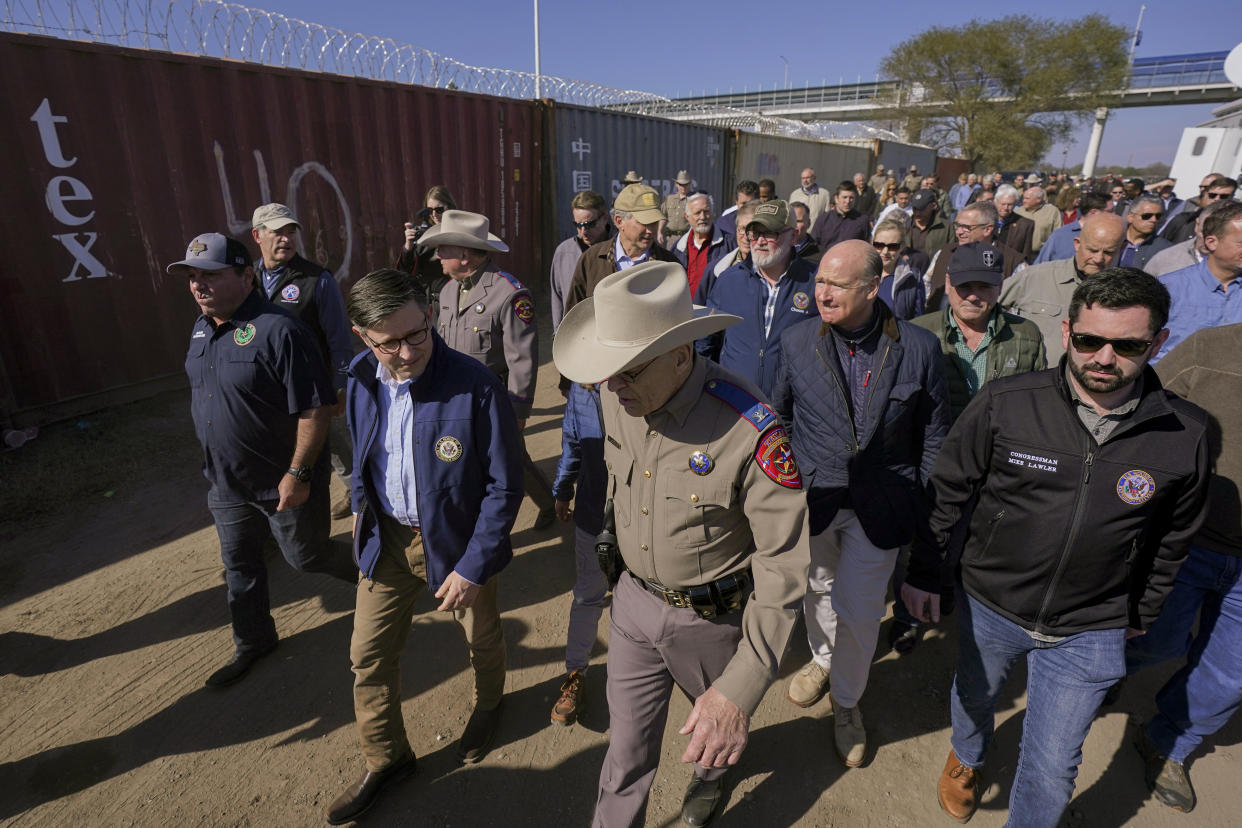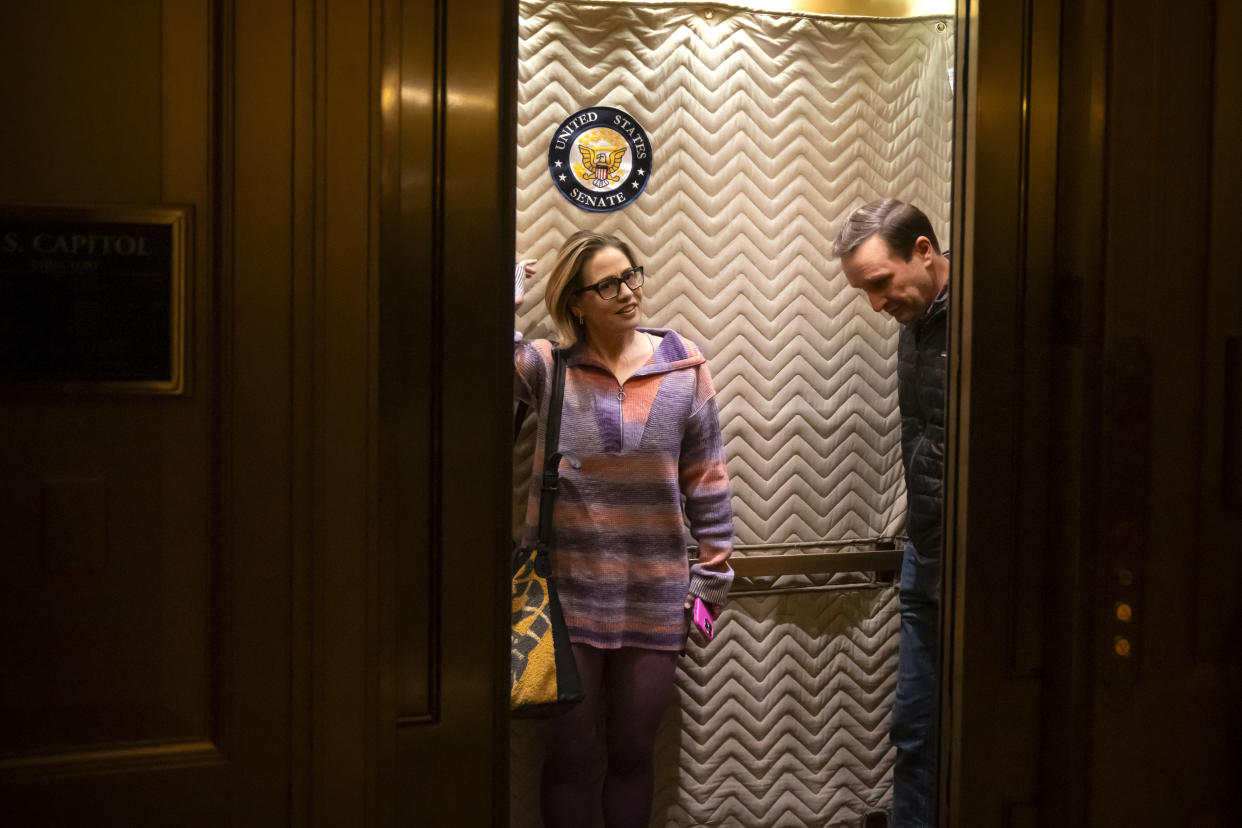Lawmakers will return to Washington with just 11 days to avert a shutdown. No fix is yet in sight.
Lawmakers will begin to return to Washington Monday with just 11 days to avoid a partial government shutdown.
The coming standoff between Republicans and Democrats over government spending is a sequel of sorts to 2023's battles — one about the debt ceiling and two about possible shutdowns — that were averted with last-minute deals.
But this latest confrontation could prove the most complicated yet. Emotional issues from the southern border to abortion to Ukraine are all likely to play a role in the complex and overlapping talks.
"It is tight to say the least," said White House budget director Shalanda Young on Friday, summing up the mood of many. "Don’t mark me down as optimistic this morning," she added.
The coming clash will also be conducted with fewer off-ramps at the ready. House Speaker Mike Johnson has repeatedly pledged no more short-term continuing resolutions — a reference to the type of bill that averted government shutdowns in both October and November.

It adds up to what is likely to be another protracted fight and one that is already beginning to extract economic costs, as agencies spend money preparing for a possible shutdown and have less freedom to launch new initiatives.
"It's definitely a problem, it's definitely a drag," said former Biden budget official Michael Linden of those already evident costs in an interview.
Impact on the broader economy
Linden, who worked in Biden's Office of Management and Budget and helped negotiate the debt ceiling deal in 2023, contends that past standoffs were averted because of last-second realizations that the pain could be severe. But it remains to be seen if the same reasoning prevails this time.
The largest threat, he adds, could be a protracted stoppage.
"As time goes on there will be breakage," he notes. "There will be damage that is hard to predict; it's very hard to know exactly how it will happen."
There is a similar concern among those in the financial community.
BTIG director of policy research Isaac Boltansky recently told Yahoo Finance Live that for now he is advising clients to "push the noise from D.C. out of their investing thought process," but that could change.
"The only thing that, when I think about a government shutdown, that worries me is that if it is prolonged," he added.
The most expensive government shutdown in history was a five-week partial stoppage that occurred in 2019 and permanently cost the US about $3 billion, according to Congressional Budget Office calculations.
Government shutdowns also delay billions of dollars more in government spending from reaching the economy, but that balance is usually made up after the government reopens.
In addition to the direct economic costs, perhaps a larger economic threat this time around comes from from the world of credit ratings.
S&P made a call in 2011 to downgrade the US credit rating. Last August, Fitch followed up with a downgrade of its own and cited government dysfunction as a key reason for doing so. Moody's made its own move in November, turning negative on the US but stopping short of a downgrade.
Young, the White House budget director, added in Friday's remarks that her main concern in the coming fight is whether another wave of Washington dysfunction "will continue to play heavily in the minds of credit agencies as they continue to look at United States creditworthiness."
Many also note there are costs to consider around the extensive preparations needed to plan for furloughing over a million federal workers, whether or not it ever happens.
"The last shutdown drama cost a lot of time and effort and energy and money just getting ready," noted Transportation Secretary Pete Buttigieg in a recent Yahoo Finance live appearance.
"The 55,000 or so men and women of this department have better things to worry about all day as they look after American transportation safety than worry about whether they're going to get paid in two weeks."
Issues at play in the talks
One swath of the government — from the Food and Drug Administration to the Energy and Transportation Departments — is currently funded only until Jan. 19, 2024. They would shut down on that date without action from Congress.
Authorization for the remainder of Washington's discretionary spending is set to expire just two weeks later, on Feb. 2.
Part of what will likely make the coming weeks hard to track is the wide array of issues and talks that may not formally be part of the shutdown conversation but appear all but certain to have a role.
First and foremost is immigration. Speaker Johnson traveled to the border this past week with GOP colleagues in an appearance that underlined the likelihood those talks will play a role in government funding.
"Shut down the border or shut down the government," was the refrain from many in Johnson's caucus. Just Friday, Speaker Johnson's team released a new memo assailing Biden for using what it called "debunked" talking points on border security.
The House of Representatives is even likely to begin impeachment proceedings in the coming days against Homeland Security Secretary Alejandro Mayorkas over his handling of the issue.
But Greg Valliere, the chief US policy strategist at AGF Investments, recently wrote that Johnson's "real weapon is the threat of a government shutdown."

And immigration is far from the only topic in focus.
The formal appropriations process has already included heated fights over social issues like abortion, LGBTQ rights, and gender-affirming care. Those clashes, which are likely to continue, arose after House Republicans inserted provisions around those issues into their proposals for how government money should be spent in the year ahead.
Aid to Ukraine and Israel is also bound up in the conversations. President Biden recently asked for nearly $106 billion in aid to Ukraine and Israel — as well as funding for combatting China and money for the border.
Republicans have blocked that request so far, saying policy changes at the border — and not just money — are needed before they will consider any additional funds.
If a shutdown is not averted, it would impact a variety of industries immediately. Aviation could be up first, with air traffic controllers potentially facing a loss of paychecks on Jan. 19 (but still being asked to stay on the job) followed by TSA agents potentially facing a similar situation in February.
The shutdown also could come as the annual tax filing season begins to get underway, with the IRS potentially facing furloughs of its own.
At this point, economic observers have begun to warn that some flavor of shutdown is now perhaps more likely than not.
Stifel chief Washington policy strategist Brian Gardner calls a shutdown "our base case" while HSBC's Jose Rasco recently said the odds of a modest shutdown "are probably higher than we're comfortable with."
Ben Werschkul is Washington correspondent for Yahoo Finance.
Click here for politics news related to business and money
Read the latest financial and business news from Yahoo Finance
